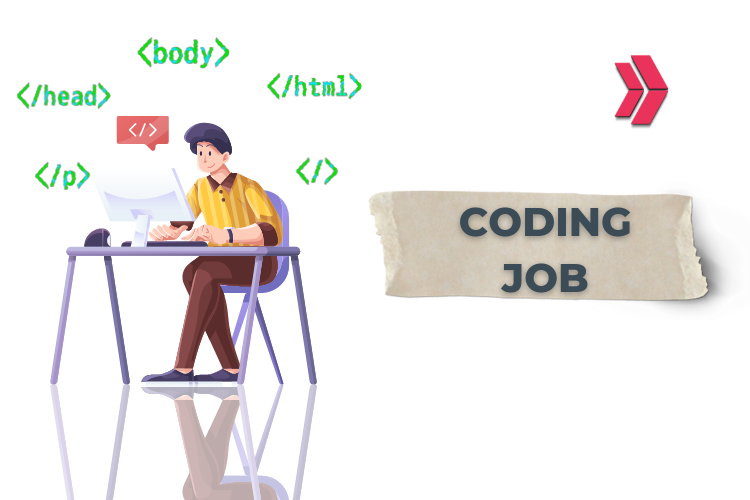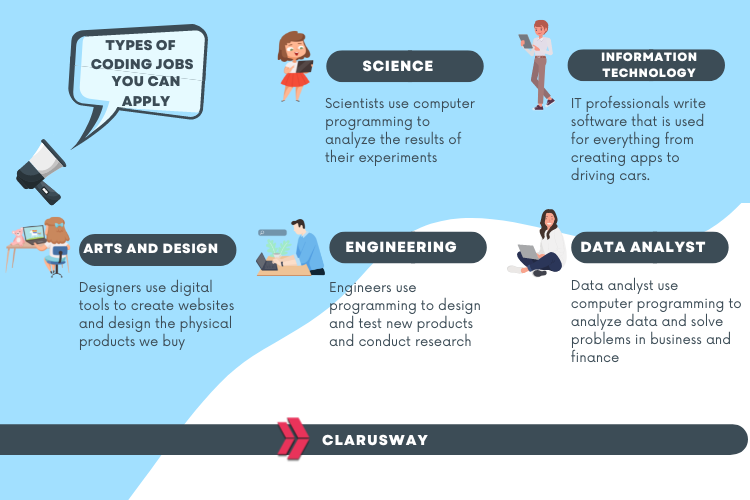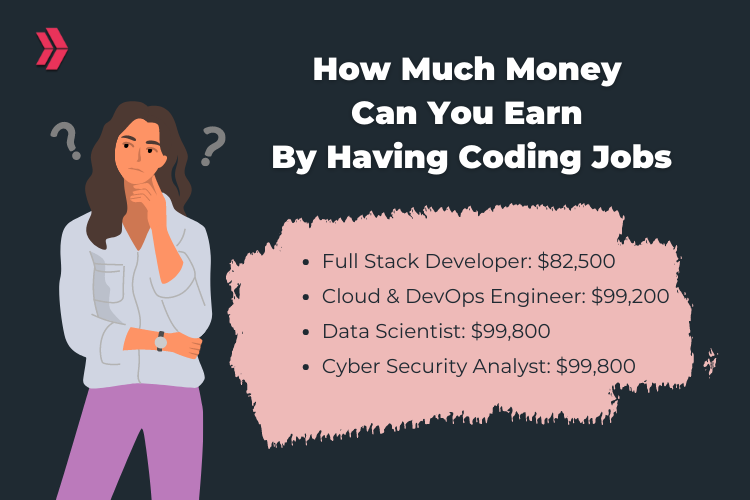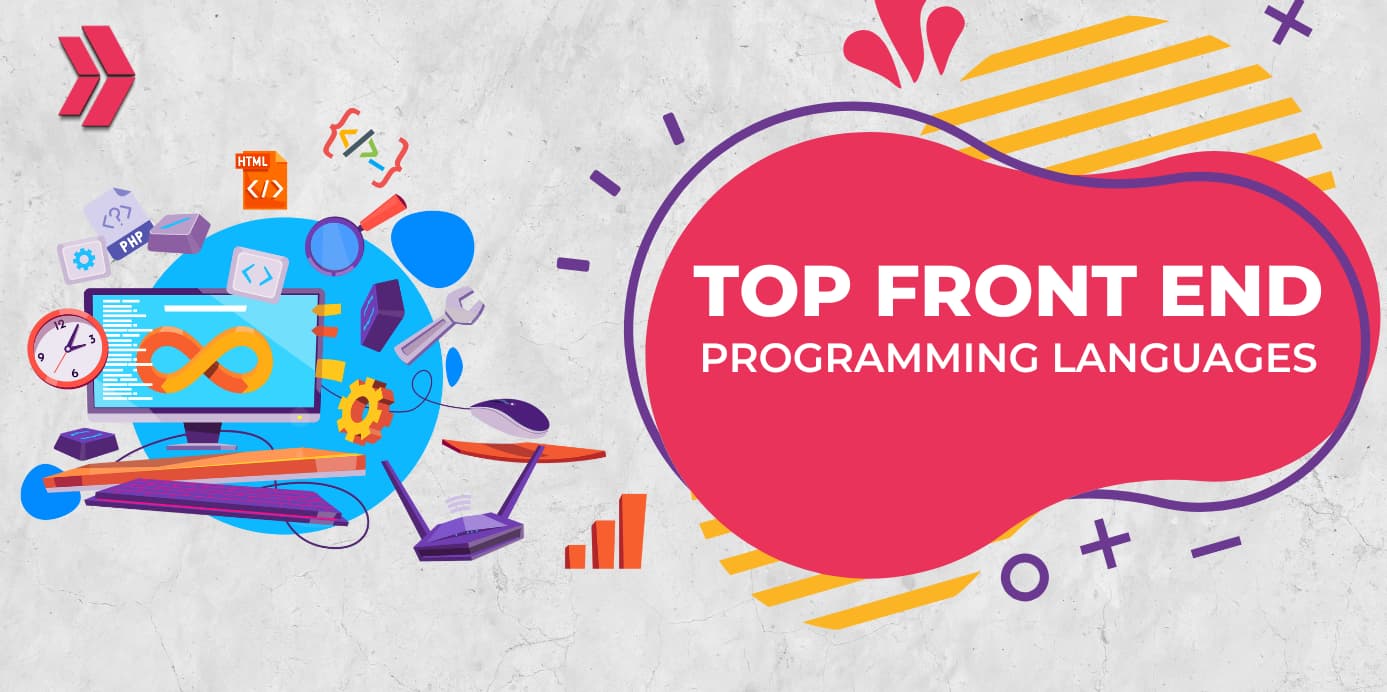It is a privilege to have a career in the IT sector. Getting a coding job can be a rewarding and high-paying career once you have improved yourself and gained enough experience in the field. In addition, you may continue to increase your income as you have more expertise in particular coding languages.
In this article, we clarify what is a coding job, the types of jobs you can apply for as a coder, and how much money you can earn by getting a coding job.
What is a Coding Job?
When you hear the word coding, the question “what is this coding job” almost always comes to mind. What do the different coding positions even involve? In a coding job your main objective is to use computer programming language or tools to create, maintain or monitor websites, applications, and programs.

In other words, coding jobs are directly related to a product, by whom, for what purpose it is used, and what you are dealing with. The positions differ in general like;
- Preparing a new software or a tool used by developers.
- Creating an application or website that directly meets the user or customer.
- Coordinating the development, maintenance, and testing steps of an application or website in the preparation process.
- Protect applications and websites from attacks and continue to work safely.
- Analysis of data obtained from sources and making them meaningful
In addition to the above, coding jobs are diversified according to the tasks performed. Let’s review them together.
Types of Coding Jobs You Can Apply
The coding jobs are directly related to your coding education and knowledge level. Therefore, the jobs you can apply for may vary depending on these parameters. So it would be best if you choose the right path and the right bootcamp according to the jobs you plan to have. In this respect, while discussing the topic, we will avoid delving into the details of education, but you should keep in mind that before a job search.
Front-End Developer:
The front-end is the client-side. Front-end developers are responsible for designing the graphical user interface. In other words, users see what the front-end developers do in the application or website.
As a front-end developer, you are expected to know some coding languages like HTML, CSS, and JavaScript; frameworks like Bootstrap, Tailwind CSS, React; libraries, tools, and more to code at the front-end side.
Back-End Developer:
The back-end of a web application is the unnoticeable part happening behind the scenes. The back-end developer is responsible for designing all back-end components and logic and connecting them to the front-end and database.
Back-end developers can work with various programming languages, including Java, Python, PHP, and Ruby. By and large, businesses also search for a back-end developer expressing proficiency in programming languages. Consequently, you may face the expression of Python or PHP developer rather than the term back-end in job postings.
Full Stack Developer:
The term “Full Stack Developer” refers to a developer profile who possesses the programming skills necessary to develop both the front-end and back-end components of software when creating web applications. Full-stack means that software and application developers are capable of participating in both phases of development.
Full-stack developers use HTML, CSS, JavaScript, Bootstrap, and other programming languages. Also, they are experts in one or more back-end programming languages, such as Java, Python, Ruby, or PHP.
Cloud Engineer:
Cloud Engineering is a branch that brings together numerous IT methods and tools under a large building. The framework’s body is composed of multiple computer infrastructures. Such as Amazon Web Services (AWS), Microsoft Azure, IBM Cloud, Google Cloud Platform (GCP), Oracle, and Alibaba Cloud offer cloud technologies.
Cloud engineering focuses on cloud services, like IaaS (infrastructure as a service), PaaS (platform as a service), and SaaS (software as a service).
Cloud engineers can be classified as Cloud Architects, Solution Architects, Cloud Software, Cloud Security, Cloud Network Engineers, Cloud SysOps, or Database Administrators. Each of these positions is focused on a specific aspect of cloud computing rather than the technology in general.
DevOps Engineer:
A DevOps engineer implements methods, processes, and tools to balance requirements in the software development life cycle, from developing and deployment to maintenance and updates.
To summarize step by step, DevOps engineer follows the software development cycle from the beginning till deployment. After production deployment to infrastructures like a cloud or on-premise DevOps Engineer clarifies how many resources are required. Lastly, DevOps engineers monitor the applications.
In short, since the development and operations teams have been merged, a new job category, DevOps engineer, has been created.
Data Scientist:
In general, data science retrieves information and insights from various data types, develops complex quantitative algorithms, and synthesizes large amounts of data. Therefore, data science jobs include essential positions such as data analyst, data scientist, and data engineering.
Typically, Data Analyst is the entry-level coding job within data science. Its primary responsibility is to analyze the data and use it to answer business questions, interpreting and communicating the results in the organization.
Characteristics that distinguish data scientists from data analysts are good computer, programming, statistics, and math skills. Thanks to these capabilities, data scientists reveal valuable data among data stacks.
Data Engineers discover patterns in data groups and set algorithms. They obtain valuable data from the raw stack for a company. In this respect, this IT position necessitates various technical skills, including an understanding of SQL databases and comprehensive programming abilities.
Cyber Security Analyst:
A cyber security analyst guards a business’s hardware, software, and networks against cyber attacks. The analyst’s primary responsibility is to gain a thorough understanding of the company’s infrastructure, constantly supervise it, and analyze potential network threats.
Cybersecurity analysts find vulnerabilities to correct before a breach occurs. And they conduct penetration tests as an ethical hacker by tools like Kali Linux and Metasploit.

How Much Money Can You Earn By Having Coding Jobs?
The earnings of the IT fields vary in the coding jobs. Salaries also vary depending on your experience in your field, from beginner to expert. However, you will inevitably have a good income when you get the job.

According to the Bureau of Labor Statistics (BLS), the average annual salary for coding work is $95,000. Let’s take a look at the median annual salaries for various types of coding jobs.
- Full Stack Developer: $82,500
- Cloud & DevOps Engineer: $99,200
- Data Scientist: $99,800
- Cyber Security Analyst: $99,800
Reinvent Yourself to Get Rewarding Coding Jobs with ClaruswayYou can have a lucrative career in the IT field and earn good money without even having an IT background. Clarusway’s advanced training methods and expert instructors are ready to help you accomplish your new career goals. Your rewarding coding job is only a few clicks away!
Last Updated on February 14, 2024




